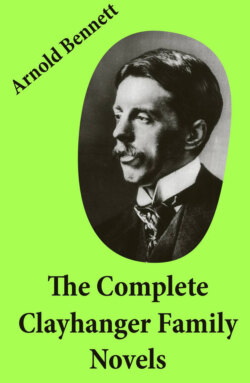Читать книгу The Complete Clayhanger Family Novels (Clayhanger + Hilda Lessways + These Twain + The Roll Call) - Arnold Bennett - Страница 110
На сайте Литреса книга снята с продажи.
Chapter 2. Father and Son After Seven Years.
ОглавлениеTable of Contents
Darius came heavily, and breathing heavily, into the little office.
“Now as all this racketing’s over,” he said crossly—he meant by ‘racketing’ the general election which had just put the Liberal party into power—“I’ll thank ye to see as all that red and blue ink is cleaned off the rollers and slabs, and the types cleaned too. I’ve told ’em ten times if I’ve told ’em once, but as far as I can make out, they’ve done naught to it yet.”
Edwin grunted without looking up.
His father was now a fattish man, and he had aged quite as much as Edwin. Some of his scanty hair was white; the rest was grey. White hair sprouted about his ears; gold gleamed in his mouth; and a pair of spectacles hung insecurely balanced half-way down his nose; his waistcoat seemed to be stretched tightly over a perfectly smooth hemisphere. He had an air of somewhat gross and prosperous untidiness. Except for the teeth, his bodily frame appeared to have fallen into disrepair, as though he had ceased to be interested in it, as though he had been using it for a long time as a mere makeshift lodging. And this impression was more marked at table; he ate exactly as if throwing food to a wild animal concealed somewhere within the hemisphere, an animal which was never seen, but which rumbled threateningly from time to time in its dark dungeon.
Of all this, Edwin had definitely noticed nothing save that his father was ‘getting stouter.’ To Edwin, Darius was exactly the same father, and for Darius, Edwin was still aged sixteen. They both of them went on living on the assumption that the world had stood still in those seven years between 1873 and 1880. If they had been asked what had happened during those seven years, they would have answered: “Oh, nothing particular!”
But the world had been whizzing ceaselessly from one miracle into another. Board schools had been opened in Bursley, wondrous affairs, with ventilation; indeed ventilation had been discovered. A Jew had been made Master of the Rolls: a spectacle at which England shivered, and then, perceiving no sign of disaster, shrugged its shoulders. Irish members had taught the House of Commons how to talk for twenty-four hours without a pause. The wages of the agricultural labourer had sprung into the air and leaped over the twelve shilling bar into regions of opulence. Moody and Sankey had found and conquered England for Christ. Landseer and Livingstone had died, and the provinces could not decide whether “Dignity and Impudence” or the penetration of Africa was the more interesting feat. Herbert Spencer had published his “Study of Sociology”; Matthew Arnold his “Literature and Dogma”; and Frederic Farrar his Life of his Lord; but here the provinces had no difficulty in deciding, for they had only heard of the last. Every effort had been made to explain by persuasion and by force to the working man that trade unions were inimical to his true welfare, and none had succeeded, so stupid was he. The British Army had been employed to put reason into the noddle of a town called Northampton which was furious because an atheist had not been elected to Parliament. Pullman cars, “The Pirates of Penzance,” Henry Irving’s “Hamlet,” spelling-bees, and Captain Webb’s channel swim had all proved that there were novelties under the sun. Bishops, archbishops, and dissenting ministers had met at Lambeth to inspect the progress of irreligious thought, with intent to arrest it. Princes and dukes had conspired to inaugurate the most singular scheme that ever was, the Kyrle Society,—for bringing beauty home to the people by means of decorative art, gardening, and music. The Bulgarian Atrocities had served to give new life to all penny gaffs and blood-tubs. The “Eurydice” and the “Princess Alice” had foundered in order to demonstrate the uncertainty of existence and the courage of the island-race. The “Nineteenth Century” had been started, a little late in the day, and the “Referee.” Ireland had all but died of hunger, but had happily been saved to enjoy the benefits of Coercion. The Young Men’s Christian Association had been born again in the splendour of Exeter Hall. Bursley itself had entered on a new career as a chartered borough, with Mayor, alderman, and councillors, all in chains of silver. And among the latest miracles were Northampton’s success in sending the atheist to Parliament, the infidelity of the Tay Bridge three days after Christmas, the catastrophe of Majuba Hill, and the discovery that soldiers objected to being flogged into insensibility for a peccadillo.
But, in spite of numerous attempts, nobody had contrived to make England see that her very existence would not be threatened if museums were opened on Sunday, or that Nonconformists might be buried according to their own rites without endangering the constitution.
